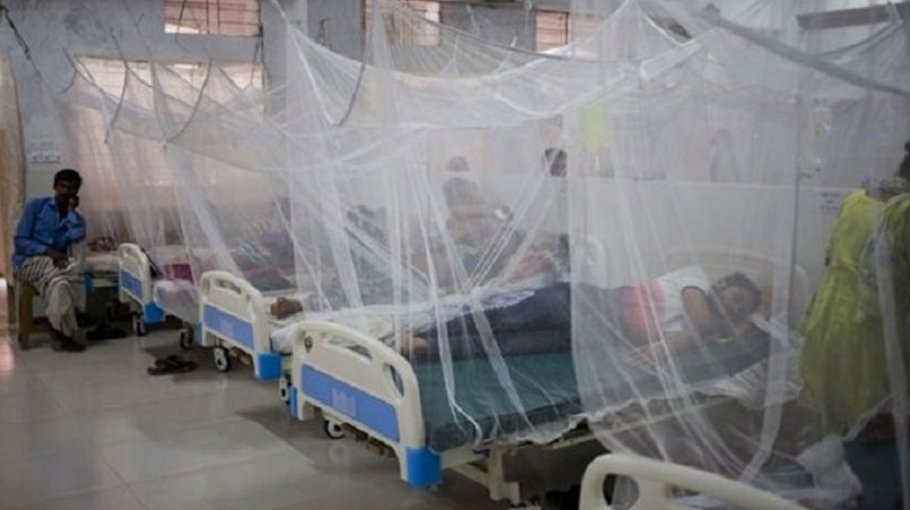Dengue patients decreasing at hospitals in Dhaka city

When Bangladesh is still reeling from the dengue outbreak as the country already has set all-time record in terms of dengue cases and deaths, pressure of the mosquito-borne disease is decreasing on healthcare facilities in Dhaka city.
"On an average, 600 dengue patients were getting admission to Mugda Medical College Hospital in every day since the beginning of July . . . up to 700 patients were admitted to the hospital (Mugda) between July and mid-August," Director of Mugda Medical College and Hospital DrMdNiatuzzaman told BSS on Thursday.
"Almost 50 percent pressure from dengue disease has reduced on Mugda Medical College Hospital since mid-August," he said adding nearly 800 people are coming to Mugda Medical College Hospital for performing dengue tests.
At present, 282 dengue are undergoing treatment at Mugda hospital, Niatuzzaman added.
Since the beginning of July this year, dengue disease has been increasing alarmingly and this increasing continued second week of August, the Mugda hospital chief said adding "We have expanded treatment facilities including dengue dedicated unit to cope with increased number of dengue patients.
He said, "We are facing relatively less pressure to deal with dengue patients as dengue cases are decreasing in Dhaka city but the dengue cases are increasing outside Dhaka."
The hospital authorities have increased capacity of pathology department engaging adequate number of healthcare professionals to provide testing reports at the quickest time, Niatuzzaman said.
Since the beginning of dengue outbreak, the Mugda hospital has been overcrowded with dengue suspected cases and the entire healthcare system of the hospital is working sincerely to provide treatment facilities to dengue patients, he added.
Director of Shaheed Suhrawardy Medical College Hospital DrKhalilur Rahman said, "In the past 24 hours, 69 dengue patients were admitted... Nearly 250 patients were admitted to Suhrawardy Medical College Hospital between early July and mid-August." The figure (admission of dengue patients) has reduced drastically in the past one week as 140 to 150 are getting at the hospital daily, he added.
Khalilur echoed authorities of other healthcare services and experts, saying dengue positive cases are decreasing slowly due to creating awareness among the people as well as intensified efforts by relevant government organizations.
The dengue positive cases have been divided into three categories, he said adding, "We are suggesting the dengue patients, who suffer from fever with less health complication, to take treatments from their homes while other two categories belong to dengue fever with multiple health complications and critical patients are being admitted to the hospitals."
Other health experts focused on taking massive efforts to avert dengue epidemic as the mosquito-borne disease is taking alarmingly turn with recording significant number of dengue patients and deaths in Bangladesh particularly in rural areas.
"All relevant organizations should take urgent initiative to control dengue outbreak as Bangladesh is in grip of dengue disease," Director of The Institute of Epidemiology, Disease Control and Research (IEDCR) Prof DrTahminaShirin said.
She said, "Community engagement is very crucial to control dengue disease. Every household in major cities has to be brought under daily surveillance to destroy any potential sources of Adedes mosquito."
The IEDCR Director said people's awareness is also a crucial factor particularly in urban areas to bring the mosquito-borne viral disease under control which prevalence has risen sharply in the country this year.
Tahmina described community mobilization as the most effective initiative to control dengue outbreak as dengue positive cases. Tahmina laid emphasis on taking integrated efforts to tackle dengue disease and said that it is impossible for a single institution to handle the menace.
Analyzing life cycle of Aedes mosquito, Former Additional Director General of the Directorate General of Health Services (DGHS) Prof DrSanyaTahmina termed it as a domestic species and said its management system will be different from other species of mosquito.
"So, it is very important to understand reproductive nature and life cycle of Aedes mosquito to take effective measures for prevention of Dengue outbreak," Sanya added.
City dwellers must be cautious about stagnant water which is the main source of breeding of Aedes mosquito, she said, adding that even a small quantity of water can grow Aedes mosquitoes leading to the spread of such deadly disease.
Sanya said even if a small quantity of water is left stagnant in any broken pot, tyre, vas or container inside and outside homes and offices, it can be breeding ground for Aedes mosquitoes.



